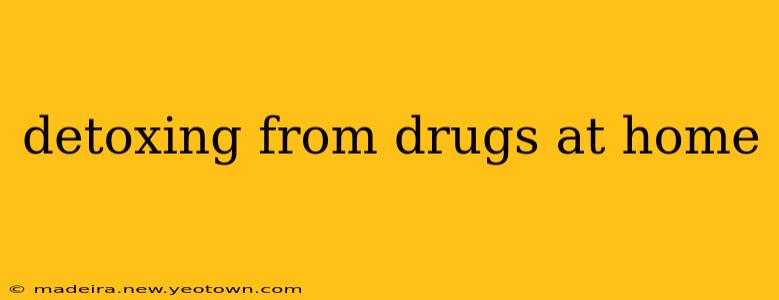Detoxing from Drugs at Home: A Risky Path Requiring Professional Guidance
The idea of detoxing from drugs at home might seem appealing – privacy, comfort, and cost savings. However, the reality is far more complex and potentially dangerous. Attempting a drug detox at home without professional medical supervision is incredibly risky and can even be fatal. This article will explore the challenges and dangers, highlighting why professional help is crucial. We’ll also address some frequently asked questions surrounding at-home detox.
Is it safe to detox from drugs at home?
No, it is generally not safe to detox from drugs at home. This is especially true for individuals addicted to opioids, benzodiazepines, or alcohol. Withdrawal symptoms from these substances can be severe, even life-threatening. These symptoms can include seizures, heart problems, hallucinations, and intense psychological distress. Without medical professionals monitoring vital signs and managing these symptoms, the risks are significantly amplified.
What are the dangers of detoxing from drugs at home?
The dangers of attempting a home detox are numerous and severe. Let's consider a few key risks:
-
Severe Withdrawal Symptoms: The intensity of withdrawal varies based on the substance, the duration of use, and the individual's physiology. However, even seemingly "mild" substances can cause dangerous withdrawal symptoms if not properly managed.
-
Seizures: Withdrawal from certain substances, like alcohol and benzodiazepines, can trigger seizures, which can lead to brain damage or death.
-
Heart Problems: Withdrawal can disrupt the heart's rhythm and increase the risk of cardiac arrest. Medical professionals can monitor heart rate and blood pressure to intervene if necessary.
-
Dehydration and Malnutrition: Withdrawal symptoms often cause nausea, vomiting, and diarrhea, leading to dehydration and electrolyte imbalances. This can be life-threatening if not addressed promptly.
-
Suicidal Ideation: Withdrawal can exacerbate existing mental health conditions and trigger intense feelings of anxiety, depression, and suicidal thoughts. Professional support is crucial during this vulnerable time.
-
Relapse: Successfully managing withdrawal is only the first step in recovery. Without ongoing support and treatment, relapse is highly likely.
What are the signs of a medical emergency during drug withdrawal?
Recognizing the signs of a medical emergency during withdrawal is critical. Seek immediate medical attention if you or someone you know experiences any of the following:
- Seizures
- Difficulty breathing
- Chest pain
- Uncontrolled bleeding
- Severe confusion or hallucinations
- Suicidal thoughts or actions
How can I safely detox from drugs?
The safest way to detox from drugs is under the supervision of medical professionals in a medically supervised detox facility. These facilities provide a structured environment with 24/7 monitoring, medication to manage withdrawal symptoms, and support from healthcare professionals. They also offer a pathway to ongoing treatment, such as therapy and counseling, to increase the chances of long-term recovery.
What is the best treatment for drug addiction?
Detox is only the first step in recovery. Long-term treatment, often involving a combination of medication-assisted treatment (MAT), therapy (cognitive behavioral therapy or CBT is often effective), and support groups (like Narcotics Anonymous or AA), is crucial for sustained sobriety.
Can I detox from drugs at home with the help of a doctor?
While a doctor might provide some guidance, they cannot effectively monitor withdrawal symptoms and intervene in medical emergencies from a distance. Even with physician involvement, at-home detox remains highly risky and is generally not recommended.
This article provides general information and does not constitute medical advice. If you are struggling with drug addiction, please seek professional help immediately. Your life is valuable, and recovery is possible. Contact your doctor, a local helpline, or a drug treatment center for assistance. There are people who want to help you on your journey to recovery.

